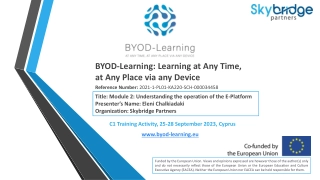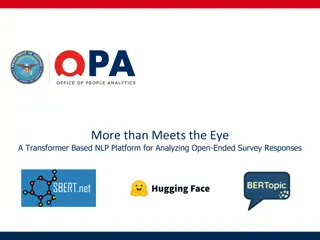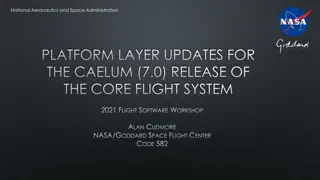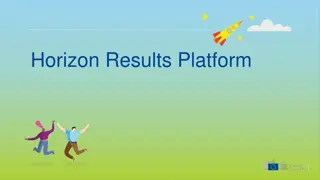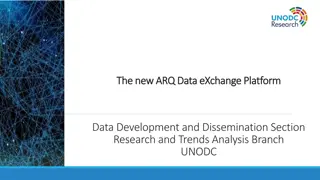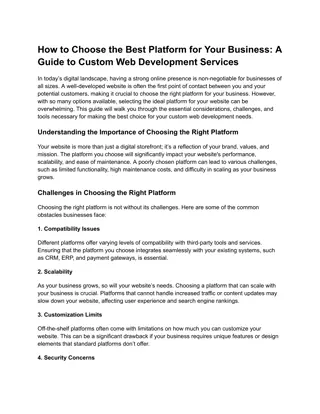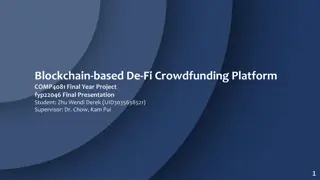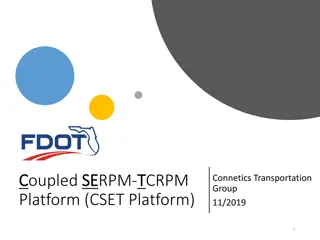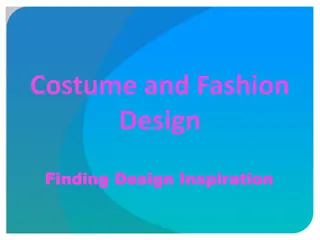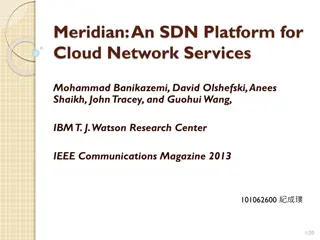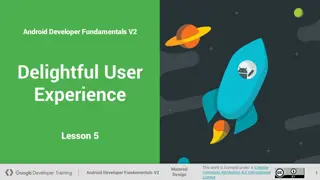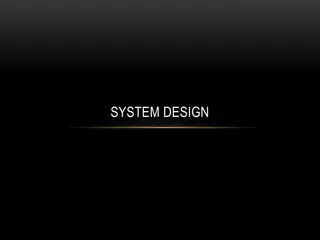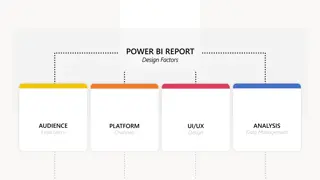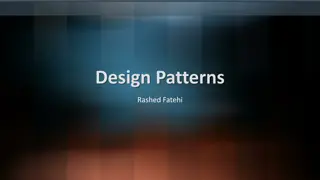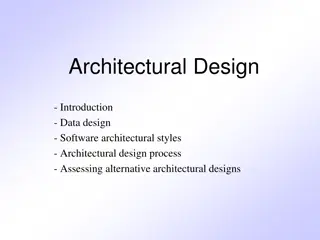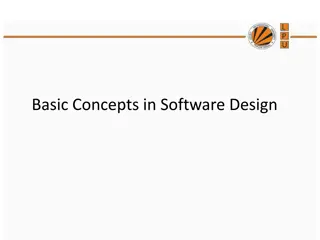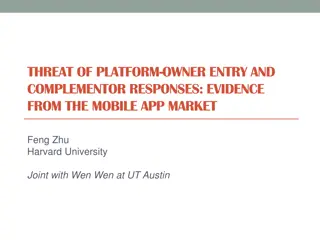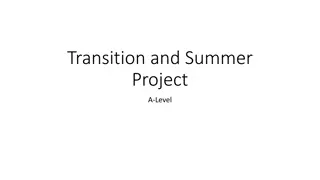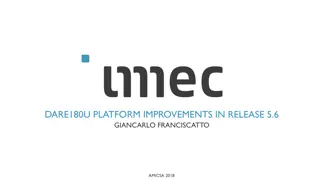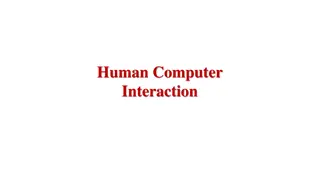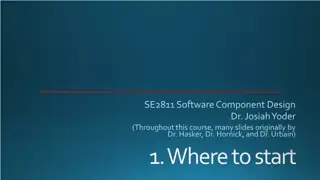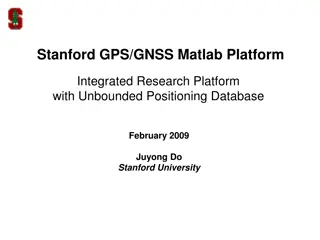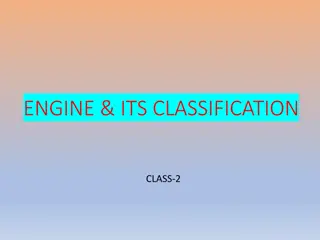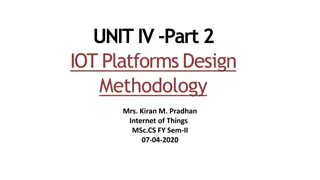BYOD Learning Platform for Flexible Education
Explore the innovative BYOD Learning Platform offering educators and students the flexibility to access math video lessons anytime, anywhere, on any device. Developed by Skybridge Partners, the platform emphasizes collaborative content creation and open licensing. Experience interactive learning thr
0 views • 55 slides
Managing Power Platform Risk with an Environment Strategy by Frank Shink, Senior Power Platform Design Engineer at Ameriprise Financial
Frank Shink, a seasoned professional, delves into the risks associated with Power Platform, from development risks to cost risks, and offers insights on tools and strategies to combat these risks effectively. He emphasizes the importance of environments, DLP policies, and licensing strategies in mit
1 views • 20 slides
Understanding Software Analysis and Design Process
Software analysis and design involve a systematic approach to understanding user requirements, creating logical models, and transitioning to detailed design specifications. Requirements analysis focuses on capturing system requirements, while design translates these requirements into implementation
7 views • 16 slides
Transforming NLP for Defense Personnel Analytics: ADVANA Cloud-Based Platform
Defense Personnel Analytics Center (DPAC) is enhancing their NLP capabilities by implementing a transformer-based platform on the Department of Defense's cloud system ADVANA. The platform focuses on topic modeling and sentiment analysis of open-ended survey responses from various DoD populations. Le
0 views • 13 slides
NASA Platform Layer Updates for the CAELUM (7.0) Release
The National Aeronautics and Space Administration (NASA) discusses platform layer updates for the CAELUM (7.0) release of the Core Flight System in the 2021 Flight Software Workshop. The platform layer consists of the Operating System Abstraction Layer (OSAL) and Platform Support Package (PSP), whic
1 views • 20 slides
Enhancing Innovation Through Horizon Results Platform
Facilitating the uptake of Key Exploitable Results (KERs) from research programs like FP7, Horizon 2020, and Horizon Europe, the Horizon Results Platform aims to translate scientific research into valuable innovations for the economy and society. Through a structured approach to identifying and prio
0 views • 8 slides
Developing the ARQ Data Exchange Platform for UNODC
Explore the development process of the ARQ Data Exchange Platform (ARQ-DXP) for UNODC, focusing on questionnaire creation, data collection, and web-based mechanisms. The platform enhances data management efficiency, provides user-friendly interfaces, and facilitates communication during data collect
0 views • 14 slides
Overview of EEU Business Plan and Budget Proposal
The EEU project aims to enhance the quality of medical education in Europe by establishing a web-based platform for continuous education of European endocrinologists. The project has made significant progress in developing an accessible platform, creating educational courses based on European guidel
0 views • 21 slides
Guidelines for Design of Cement Concrete Pavement and Interlocking Paver Blocks
This document provides guidelines for designing cement concrete pavements and interlocking paver blocks, covering factors governing design, wheel loads, design period, subgrade characteristics, approximate k values based on CBR values, and the importance of a sub-base below concrete pavements. It em
0 views • 67 slides
Revolutionizing Education with an Interactive Learning Platform - CLIQUE
CLIQUE is a game-changing interactive learning platform designed to address the shortcomings in traditional education systems by empowering educators and students with advanced tools and technologies. Through features like self-learning, streamlined content delivery, e-content creation, and live cla
1 views • 11 slides
Software Engineering Design Principles and Concepts
The chapter discusses the essential principles and concepts in software design, highlighting the four key design models - data design, architectural design, interface design, and component-level design. It emphasizes the importance of traceability to the analysis model, minimizing the gap between so
0 views • 36 slides
Crowdfunding Platform for Business Financing and Investment Opportunities
This content provides information about a crowdfunding platform established in 2016, focusing on helping businesses raise money through selling ownership pieces or taking loans from regular people. It delves into the process, advantages, regulations, and costs associated with utilizing the platform
0 views • 15 slides
How to Choose Best Platform for Your Business
Struggling to find the right platform for your business website? In today's fast-paced digital world, choosing the right web development platform is crucial to your success. Our latest blog, How to Choose the Best Platform for Your Business: A Guide
0 views • 5 slides
Blockchain-Based De-Fi Crowdfunding Platform Final Year Project Presentation
This project explores the integration of blockchain technology and decentralized finance (De-Fi) in a crowdfunding platform to address the limitations of traditional crowdfunding systems. It discusses the background of crowdfunding, De-Fi, motivations behind the project, methodologies like blockchai
0 views • 19 slides
Transportation Network Modeling and Analysis with C.Coupled SE Platform
This content outlines the features and functionalities of the C.Coupled SE Platform (CSET Platform) developed by the Connetics Transportation Group. It covers aspects such as interface design, inputs merging, purposes, platform development using Cube, TAZs merging, and network attributes. The platfo
0 views • 11 slides
Impact of Rating-Based Platform Screening on New Complementor Entry
This study explores the effects of a platform design that ranks incumbent complementors based on review ratings on new complementor entry and overall complementor quality. The findings suggest that the rating-based platform screening reduces new complementor entry but enhances complementors' overall
1 views • 9 slides
Understanding System on Chip (SoC) Design and Components
Explore the world of System on Chip (SoC) design, components, and working flow. Learn about Intellectual Properties (IP), platform-based design, typical design flows, top-down design approach, and the emerging Electronic System Level (ESL) design flow. Discover the essential components of an SoC, su
0 views • 45 slides
Exploring Design Inspiration and Elements in Costume and Fashion Design
Dive into the world of costume and fashion design through a visual journey of finding design inspiration, understanding the design process, emphasizing originality, and exploring different sources of creativity. Discover how technology, art, food, history, architecture, and nature can spark innovati
0 views • 45 slides
Enhancing Piping Design Efficiency with Spec-Driven Technology
Explore how Spec-Driven Piping technology powered by CADACTIVE offers a standardized approach for piping design in Creo Parametric. This innovative extension streamlines design communication, eliminates errors, and improves design efficiency by utilizing a master catalog, automated checking capabili
0 views • 15 slides
Meridian: An SDN Platform for Cloud Network Services
Meridian is an SDN platform developed by Mohammad Banikazemi, David Olshefski, Anees Shaikh, John Tracey, and GuohuiWang at IBM T. J. Watson Research Center. The platform focuses on providing cloud network services efficiently. It encompasses an architecture that enables faster and more convenient n
0 views • 21 slides
Material Design: Combining Classic Design Principles with Technological Innovation
Material Design is a design language that combines traditional design principles with the possibilities offered by technology and science. It emphasizes visual language, classic design elements, and innovation to create delightful user experiences. The Material Metaphor, Imagery, Typography, Color,
0 views • 34 slides
Comprehensive Guide to System Design Components and Techniques
System design involves the detailed planning and identification of components in an information system, aiming to provide users with a general understanding of the new system. This process includes techniques like flowcharts, prototyping, and component design, covering aspects such as output design,
0 views • 24 slides
Development of GR740 Single Board Computer Reference Design by RUAG Space and Partners
RUAG Space collaborates with Gaisler and other partners in the development of a GR740-based single board computer reference design funded by ESA. The project aims to create an advanced technology platform for future space projects, leveraging RUAG's expertise in electronics and digital computers for
0 views • 12 slides
Power BI Report Design Factors Overview
Power BI report design factors cover key aspects such as audience segmentation, user analysis, platform channels, UI/UX design, data management, and analysis. Understanding your audience, utilizing different platform channels, focusing on UI/UX design, analyzing data effectively, and optimizing perf
0 views • 15 slides
Understanding Design Patterns: A Comprehensive Overview
Exploring the world of design patterns, this content delves into the essence of design patterns, their application in software design to resolve complexity, and the different types of design patterns - creational, structural, and behavioral. It also showcases examples of popular design patterns such
0 views • 22 slides
Understanding Software Architectural Design in Computer-Based Systems
Exploring the importance of software architectural design in computer-based systems, this content covers key aspects such as data design, software architectural styles, the architectural design process, and assessing alternative designs. It delves into definitions, the architectural design process,
0 views • 45 slides
Understanding Basic Concepts in Software Design
Software design involves transforming customer requirements into a form suitable for implementation, with activities categorized into preliminary and detailed design stages. High-level design focuses on module identification and control relationships, while detailed design entails defining data stru
1 views • 24 slides
Understanding Threats and Responses in the Mobile App Market
The study explores the impact of platform-owner entry on complementors in the mobile app market, examining evidence from platforms like Facebook, Uber, Android, Alibaba, iOS, and WeChat. Concerns from complementors about imitation by platform owners are discussed, along with views from platform owne
1 views • 19 slides
Exploring 3D Design and Critical Analysis in Architecture
Dive into the world of 3D design and critical analysis with a focus on architecture. Discover the stages of design, essential skills for designers, and areas of study in three-dimensional design. Delve into iconic buildings like Frank Lloyd Wright's Falling Water, analyze their key features, and eve
0 views • 9 slides
Understanding Design Patterns in Object-Oriented Design
Design patterns in object-oriented design (OOD) are essential templates that codify best practices for solving common problems. They help streamline development by capturing proven design decisions, promoting code reuse, and enhancing system flexibility and modularity. Learn about the core concepts,
0 views • 20 slides
Ranking Refactoring Suggestions Based on Historical Volatility
Design problems in software development can be identified based on non-compliance with design principles, excessive metric values, violations of design heuristics, and lack of design patterns. By assessing the urgency to resolve these problems using past code versions, a ranking mechanism can priori
0 views • 30 slides
DARE180U Platform Enhancements in Release 5.6 - AMICSA 2018
The DARE180U platform introduces radiation-hardened ASIC design capabilities on UMC 0.18μm CMOS technology for space and high-energy physics applications. Supported by ESA and featuring ITAR-free components, it offers libraries, IP, and design services for front-end and back-end design flow. The pl
0 views • 19 slides
Understanding Interaction Design in Human-Computer Interaction
Interaction design focuses on creating interactive products that are easy, effective, and enjoyable to use. It aims to reduce negative user experiences while enhancing positive ones. Designing interactive products requires understanding user activities, interfaces, and device arrangements to support
0 views • 11 slides
SE2811 Software Component Design Overview
This course covers software component design, design patterns, object-oriented design, algorithms, and opportunities for reuse in systems design. It emphasizes the importance of domain-level design and provides insights into solving core problems through reusable classes.
0 views • 21 slides
Analysis of Bunch Lengthening in CEPC for Different Design Parameters
This study explores bunch lengthening in the Circular Electron Positron Collider (CEPC) for various design parameters, analyzing a 54 km design scheme, a 61 km design scheme, and a 100 km design scheme. The analysis includes the theoretical framework used, equations for bunch lengthening, and conclu
1 views • 15 slides
Understanding Plain & Reinforced Concrete Structures in Design Engineering
In the design of Plain & Reinforced Concrete structures, various strength design methods such as Ultimate Strength Design (USD) and Allowable Strength Design (ASD) are utilized. These methods involve factors of safety, material strength, load factors, and analysis in the elastic range. Additionally,
0 views • 11 slides
Stanford GPS/GNSS Matlab Platform Overview
Stanford GPS/GNSS Matlab Platform (SGMP) is an integrated research platform developed at Stanford University for GPS research activities. The platform provides tools for utilizing GPS/GNSS measurements in various formats, converting positioning databases, simulation capabilities, and user interfaces
0 views • 21 slides
Understanding Engine Classification and Design
Engine classification involves categorizing engines based on various factors such as combustion type, number of strokes, cylinder design, and ignition method. Common classifications include external and internal combustion engines, as well as categories based on the design and use of the engine. Add
0 views • 11 slides
Enhancing Equality and Inclusion at UCL through Report and Support Platform
UCL's Office of the President and Provost has implemented the Report and Support platform to promote equality, diversity, and inclusion. The platform allows easy reporting of incidents, enables better monitoring, and offers options for anonymous reporting. Data collected is analyzed to address probl
0 views • 15 slides
IoT Platform Design Methodology and Specifications
This content elaborates on the IoT platform design methodology, including purpose and requirement specifications, process specification, domain model specification, and information model specification. It also covers IoT level specifications, functional view specification, operational view specifica
0 views • 10 slides
